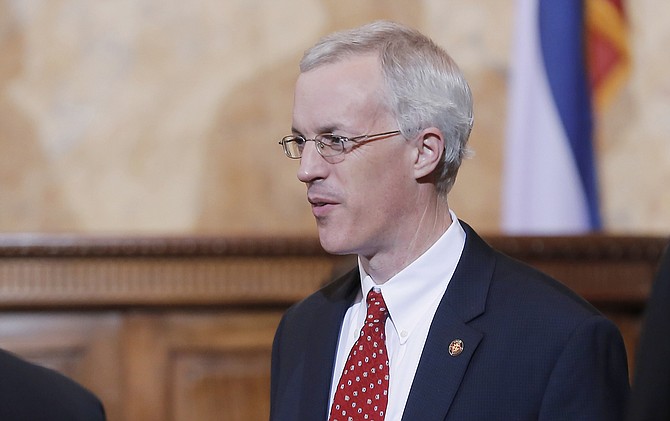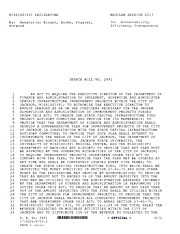Sen. David Blount, D-Jackson, proposes a new and improved version of the city’s infrastructure plan that failed last year. It would place $24 million under the control of the state Department of Finance and Administration. Photo by Imani Khayyam.
JACKSON — Jackson legislators are working with city leaders to bridge the gap between needed infrastructure improvements totaling over $1 billion, and the City's tight budget.
Last year, a potentially significant bill called the Capitol Complex Improvement District failed in the final hours of the legislative session after Lt. Gov. Tate Reeves and other leaders inserted last-minute language during conference between the House of Representatives and Senate that included a special appointed judge to rule over crimes in what would have been a separate judicial district in the interior of downtown.
Jackson now has several paths to becoming the beneficiary of state support, and not all of the capital city's legislators support every plan.
Giving Bryant More Control
During a small informal meeting at the Greater Belhaven Neighborhood Foundation on Jan. 12, Sen. David Blount, D-Jackson, explained that his approach to the problem of supplementing Jackson's infrastructure while placating state interests is to hand the reins over to the governor.
"The new proposal this year essentially gives Governor Bryant and his appointee the power to choose where to spend this money in the City of Jackson, and I don't really have a problem with that," Blount said. He said he pitched the legislation to the governor the day before while Bryant had his cowboy boots shined.
Blount's bill hands the new infrastructure program, estimated to be about $24 million a year, over to the state Department of Finance and Administration, whose head is a gubernatorial appointee.
The bill would also create a committee of informed parties, including University of Mississippi Medical Center and Jackson State University representatives, who would create a plan for the money, a plan that would then pass on to the Jackson City Council for approval. The committee is called the "State Capital Infrastructure Fund Project Advisory Committee." The DFA head would chair this committee which at the moment consists of 11 members: the mayor's three appointees, two for the governor, one for the lieutenant governor, one member from the speaker of the house, one seat for the president of Jackson State University, one selected by the dean of the University of Mississippi School of Medicine, one appointed by the Board of Trustees for the Mississippi Department of Archives and History, and finally, the DFA head or his or her designee.
"The Department of Finance and Administration shall develop a comprehensive plan for improvement projects in the city in consultation with the State Capital Infrastructure Fund Project Advisory Committee," Blount's bill states. "The plan shall attempt to incorporate the needs of the city, the DFA, JSU, the UMMC and the Mississippi Department of Archives and History. Any plan developed by the department must be approved by the governing authorities of the city." The bill states that the plan may be updated at any time but must be updated at least every five years.
The state's finance department would then implement the plan after City approval, Blount said. Some details of the law, such as who would be on the committee that would develop the plan, could change during the legislative process.
Last year's Capitol Complex Improvement District bill laid out a committee-based approval system similar to how the 1-percent sales-tax commission works now, with some of the members appointed by state-interests balanced out against representatives determined by Jackson leaders.
"The 1-percent sales tax commission seems to not really be able to operate smoothly," Blount said of the group assembled to decide how to use funds supposedly targeting Jackson infrastructure. "I think the governor is going to take Capitol Street and fix it."
Other Options, Too
Blount's bill is not the only option on the table this session. DeSoto County's Sen. David Parker, a Republican, authored a bill that Jackson Sens. Hillman Frazier, Sollie Norwood and John Horhn but not Blount co-authored, designed to create an "Additional Sales Tax Revenue for Municipal Infrastructure Program." The program would divert monies to municipalities only if the total sales tax revenue, as certified by the Commissioner of Revenue, increased by more than 1 percent over the year before.
Blount said the bill would drain money from the state, if every city took advantage of the program.
Sen. Horhn also introduced a way to help the capital city defray some of the costs of maintaining the infrastructure necessary to support the seat of state government, by taking 2 percent of the gasoline, diesel fuel and kerosene taxes on sales within Jackson.
This was also a big push from one of the city council members, Ward 4 Councilman De'Keither Stamps, during a council meeting concerning the upcoming legislative session.
Email city reporter Tim Summers Jr. at tim@jacksonfreepress.com.
More like this story
- UPDATED: New Jackson Infrastructure Bill; Virgi Lindsay to Run for Ward 7 Seat
- Legislators, Get the City’s Infrastructure Bill Right
- ‘Capitol Complex’ District Would Fund (Parts of) Jackson
- What’s Ahead for the Capitol Complex?
- UPDATED: Capitol Complex Bill with Funds for Jackson Passes, Heads to Governor
More stories by this author
- DA Smith Wins on One Count, But Passes on 'Whistleblower' Bad Check Claims
- Mayor Yarber, Socrates Garrett Address Contracting Dispute, 'Steering'
- UPDATED: Jury Finds Allen Guilty for Cell-phone Payment, Not Guilty on Nine Counts
- Allen Trial: Defense Rests After Making Case DJP Doesn’t Collect 'Taxes’
- DJP Board Attorney Gibbs Takes Stand to Defend Ben Allen's Actions




Comments
Use the comment form below to begin a discussion about this content.